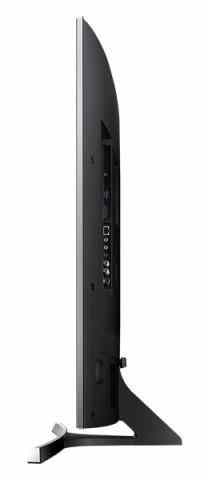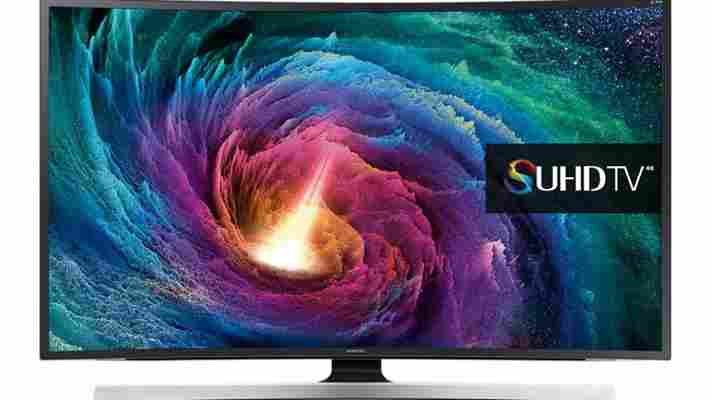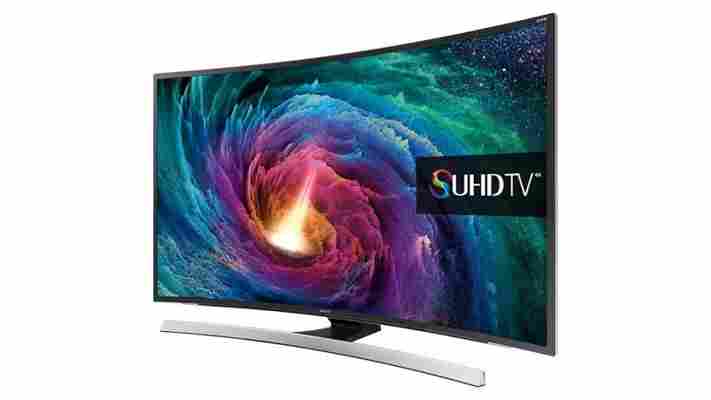With this year's models almost upon us, Samsung's 2015 TVs are now cheaper than ever – which is great news if you're not fussed about having the latest thing, as there's some considerable saving to be had in return.
Of course, at £999, the JS8500 is hardly cheap even by 2016 standards, but considering its initial asking price was £1,549, a saving of £550 isn't something to be sniffed at. It's the entry-level set in Samsung's premium 4K SUHD series, too, so you get a quantum-dot display instead of a regular LCD like the JU7500 as well as High Dynamic Range (HDR) support, giving it some much-needed future-proofing for the influx of 4K HDR content about to hit the market, most notably in the form of Ultra HD Blu-rays .
For this review we tested the 48in model in the JS8500 range, but it's also available in 55in (UE55JS8500) and 65in (UE65JS8500) screen sizes. All models have identical specifications except for their dimensions and power usage. We're confident that image quality will be practically identical across the range.
Design
The TV itself looks stunning. Available in 48in, 55in and 65in screen sizes, its curved base and slim bezels have a hairline metallic finish, and the recessed stand that sticks out the back almost makes it look like the TV is floating.
It doesn't have a lot of overt branding, either, save for a very small Samsung logo at the bottom of the TV and an understated SUHD badge in the top right corner. Neither stand out from a distance, though, and its subtle curve only adds to its premium, and elegant design. It has a 3m 'curvature radius', which means it would neatly fit into an imaginary circle with a 3m radius, but it's more an indication of the ideal viewing distance, as the larger 55in and 65in sets in the JS8500 have even shallower 4.2m curvatures.

Picture quality
With a quantum-dot panel at its disposal, the JS8500 has superior image quality to pretty much any standard LCD TV. This is because the nano-crystal technology produces a far cleaner backlight than the usual LED-backlit systems. Samsung still uses LEDs on the JS8500, but the light from these are shone on top of the nano crystals, producing a purer RGB light.
This is great news for the LCD panel, as it's getting exactly the right wavelengths of light it wants, making it easy to filter them and create the best possible picture. In short, Quantum Dot TVs are able to produce a greater range of colours, have better colour accuracy and allow for brighter whites and deeper blacks.
This certainly seemed to be the case in our calibration tests, as its default Movie settings produced an incredible black level of 0.05cd/m2 and its sRGB colour gamut coverage hit a full 100%. Admittedly, Movie mode can't hit the same brightness levels as other Samsung picture presets, such as Standard or Dynamic, but then again Movie mode has been specifically designed for use in more subdued lighting conditions. I also found it had the most accurate colours, so I stuck with Movie for the remainder of my testing.
With the backlight turned up to maximum, the JS8500 achieved a respectable 258.53cd/m2 in Movie mode, but this also increased the black level to 0.11cd/m2. Still, its contrast ratio of 2,434:1 is incredibly impressive, and this superb picture quality translated into some brilliant-looking film footage.
In Gravity, for instance, the depths of space were wonderfully dark and inky, and its speckle of stars and planets didn't destroy the overall depth of the scene. If you're after truly black blacks, though, then you might want to switch on the JS8500's Black Tone setting, although I found that anything higher than Dark started to lose some of the bright star detail.

The JS8500's 120Hz panel also handled fast-moving objects incredibly well, showing few signs of judder. However, for those who like their camera pans to be silky smooth, then Samsung's Auto Motion Plus settings do an excellent job of eliminating any remaining movie shutter effects. While it has a couple of preset modes available, by far the best option is Custom, which allows you to set the blur and judder reduction manually. Everyone will have their own personal preferences, but I found setting each one to 7 struck a good balance.
Of course, with a native resolution of 3,840x2,160, the JS8500 looks best when viewing 4K content. While Ultra HD Blu-rays still haven't quite made their way on to shop shelves yet, our test clips looked as lovely as ever, and our HDR clips provided a noticeable boost in brightness, making everything feel all the more impressive and immersive.
The only slight hitch I have with the JS8500 is that the curved panel's viewing angles tend to peter out slightly when you don't sit slap-bang in the centre. As I moved from side to side, colours definitely lost some of their vibrancy, which might not be ideal if you're planning to put it in a large living room.
Sound
The downward-firing 40W speakers also left something to be desired, as voices in particular seemed to be rather muffled compared to rest of the film's soundtrack. They're fine for general TV, but you'll probably want to factor in the additional cost of a sound bar or dedicated sound system to get the best audio experience for your film collection.
Upscaling
One thing you don't need to worry about is the JS8500's upscaling capabilities. Blu-ray discs looked great on its 4K panel, and HD TV channels had a surprisingly good level of detail present, too. You'll probably need to enable the MPEG noise reduction and Digital Clean View settings for standard definition channels, but this is pretty standard practice on modern, big screen TVs.


Leave a Reply